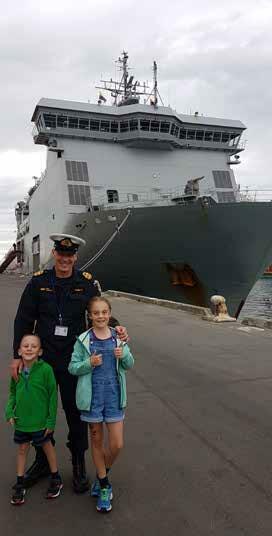
9 minute read
Regional Naval Officer in Southland
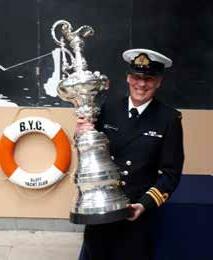
LTCDR Nigel Finnerty with his children Sara and Cooper in front of HMNZS CANTERBURY in Bluff, March 2020. Holding up the America’s Cup during a tour in 2017.
A Southland eye on all things military
Invercargill and Bluff, steeped in maritime heritage, might instinctively scream Navy, but the Regional Naval Officer (RNO) for Southland has to be prepared for anything involving the New Zealand Defence Force.
Reservist Lieutenant Commander Nigel Finnerty, the Chief Executive of Invercargill Airport, served in the Royal New Zealand Navy from 1981 to 2001, starting off as an apprentice marine fitter.
“I’m from Bluff, a thriving port and fishing town on the Southern Coast of the Mainland. I had been in been in the Te Ara O Kiwa Sea Scouts so had had been playing around in boats forever, so when the Navy Recruiters came to Southland Boys High looking for engineers, I went along, and the rest is history as they say. Three of us from Boys High joined the Navy in January 1981.” As a Sea Scout LTCDR Finnerty had been fortunate enough, in 1980, to travel on board guided missile frigate USS MARVIN SHIELDS (FF 1066) from Bluff to Auckland, which gave him his first taste of Navy life at sea. In the Royal New Zealand Navy, he went up the ranks to Chief Petty Officer Marine Fitter, then, after nine years, had another completely different career commissioning from the ranks as a Marine Engineer Officer. It was less than a year after he left the Navy that the then current RNO suggested he take over the role. It’s been his since 2002.
“There was a time when Bluff could be really busy for Navy ship visits,” he says. HMNZS CANTERBURY was due to come down this year for a Sub-Antarctic Islands mission but was retasked for Tonga relief work. But there’s still plenty to do. LTCDR Finnerty has been the Navy’s representative for Waitangi Day at Te Rau Aroha marae in Bluff and was delighted when the Deputy Chief of Navy came down last year. He supports the Air Cadets of No. 12 (City of Invercargill) Squadron and the Army Cadets of the Invercargill Cadet Unit, particularly at their end of year parades. Some of the Southlandbased Naval Reserves from HMNZS TOROA have joined in with the Army’s Territorials in Invercargill on parade nights undertaking weapons drills and supporting the Army’s training. LTCDR Finnerty recently passed his MSFT through the Territorials. The Southern RNO’s role is varied. When the Navy’s not in town he gets to support the other parts of the NZDF through his role at the airport. “When we had the 2020 floods down in Southland, the airport was the only transport route in or out of Invercargill. We had an Air Force NH90 helicopter turn up, and I helped crew find accommodation. That’s the sort of thing you look after. We also get P-3 Orions landing here, preparing to head into the Southern Ocean. The Seasprites come down reasonably often and it’s great to be able to show them off. It’s the perks of working at the Airport.” Sure, the ships are the ‘headline’ when they come into Bluff, he says. “In the South you have to be flexible and agile. No matter what colour uniform you wear, we’ll give a warm welcome and maybe even a cheese roll.”
Volunteer at large
For National Volunteer Week, Navy Today acknowledges those who step up for their community. We meet Lieutenant Jack Walters, HMNZS AOTEAROA.
Lieutenant Jack Walters has spent a lot of time at sea, both as a Seaman Combat Specialist and then again by commissioning from the ranks to a Warfare Officer. When he found himself posted ashore for a year and a half, he realised he had spare time on his hands and wanted to spend it gainfully. He discovered the mentorship programme Big Brothers, Big Sisters in 2019 from the Nelson Regional Naval Officer, Commander Cathy Knight, during a port visit in HMNZS WELLINGTON as the Visit Liaison Officer. The programme sets up adult volunteers spending one-on-one time with a young person, aged between 6 and 12, usually once a week. His mentee is 10-year-old Henry. Activities can be simple, such as kicking a ball around, or walks on the beach. But LT Walters has also organised some high-end fun; RHIB rides, Snow Planet, and visits to the Titirangi Volunteer Fire Brigade – where LT Walters is also a Volunteer Firefighter. “It’s exciting and meaningful for him,” LT Walters says. “Henry enjoys and has benefited from the programme, there are stages when he wants to be in the Navy. It’s not without its challenges, but it’s worth it to help out in some way. It’s about hanging out with a big buddy, a safe person, and being a positive role model for them.” LT Walters’ tendency to make himself useful came to the fore during the first COVID lockdowns in 2020, when suddenly everyone had time on their hands and very few places to go. He knew he had elderly neighbours, and it was a time when the elderly were considered vulnerable. He volunteered to collect groceries for them when he went shopping. That grew into becoming a volunteer delivery person for the Red Cross’ Meals on Wheels programme. “It was something I remember my Mum doing when I was young. After obtaining my supervisor’s approval, I signed on with Meals on Wheels. They were grateful; I think a lot of their regular drivers were out of action due to COVID. It made me feel more useful during lockdown and was a welcome change from Zoom meetings.” He enjoyed the work. “A lot of them, surprised by my relative youth and (large) size asked me what I did, and I told them I was in the Navy.” There was plenty of chitchat and offers of a cup of tea, which he had to decline. “They were glad the service was still going during lockdown.” He’s been a Volunteer Firefighter for three years. “One of my best mates, Leading Seaman Combat Specialist Dylan Thomas, had been doing Volunteer firefighting since before he joined the Navy. I was really inspired by him and it sounded up my alley. He convinced me to check it out with him and I’ve been there since.” Navy personnel are trained to fight fires as part of their Damage Control training, and the Station Volunteers were impressed with the calibre of Navy training. “I’ve been on call-outs, turning up to car crashes, doing CPR and critical assists. I’ve been to some large house fires. These are mostly sad events for the victims, but it is worth it to be able to help people and the community in their time of need.” LT Walters hopes his story will show others in the RNZN that volunteering is conducive alongside their career in the Navy. His advice: “Volunteering at different levels, be it with another organisation, just helping someone or doing a bit extra in the Navy such as being on a Ships Welfare Committee or an AntiHarassment Advisor is usually just as rewarding for the volunteer as it is for the recipients. Everyone contributing a little bit helps keep society running smoothly and I would encourage anyone to give it a go.”
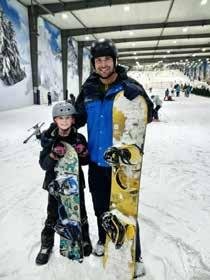
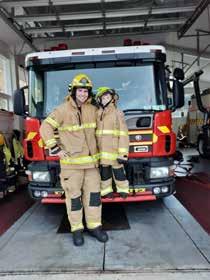
Strive for Success
When Leading Logistics Supply Specialist Boogie Kerekere graduated from Basic Common Training in 2012, her partner Steven surprised her by announcing he was in the Navy’s next intake of sailors.
“Honestly, he doesn’t tell me much,” she laughs, but it’s obvious that good communication is a big part of what has really worked well for two successful sailors, now with four-yearold twins.
LLSS Kerekere is the Supply Section Supervisor at HMNZS MATATAUA, while Leading Marine Technician (Propulsion) Steven Maynard is posted to HMNZS AOTEAROA.
Recently LLSS Kerekere, a nominee for Sailor of the Year, received a New Zealand Defence Commendation for her work in her previous posting, at the Naval Supply Depot. The pair are from Gisborne and were partners before moving to Auckland. “I joined because I didn’t really know what to do when I left school,” says LLSS Kerekere. “I joined the Tairāwhiti Services Academy during my last two years at Gisborne Girls’ High School and that helped. Gisborne is a small town; you either leave or you don’t. I just said, stuff it. I will try and get into this intake and just go for it.” LMT(P) Maynard was similar, she says. He didn’t want to go to university. “He said, I just want to do something. He didn’t tell me he was going for the Navy! But it’s worked out well.” She’s had some good trips with the Navy on different ships, and connected with a lot of people. “The Navy’s been good for me. And I’ve grown into this more mature young parent and mother. You get a better perspective on life, and what it throws at you.” The Navy backed her when she found out she was going to have children. “I got posted ashore for a time, then I took a year off – all of 2018. I came back in 2019. When Steven posts off HMNZS AOTEAROA and does courses ashore, that is when I can post onto a ship.” Navy day care is a lot cheaper than civilian models and is a lot closer to work and home for her, she says. “And then when you have those days when you have to up and leave, the Navy knows what it’s like. You don’t have to worry about having enough leave.” Career-wise, being a parent hasn’t knocked either of them back. “The time ashore has given me the opportunity to finish courses. I was a two-star Able Rate and I only had one course to do and I did it straightaway. When I came back from parental leave I got promoted to Leading Hand. That was my goal – it was pretty much, let’s get back, it’s Mahi time.” That’s not to say it’s easy. “My situation is pretty good, but when one of us is away on ship, the other is doing it by themselves. The majority of our whanau are based in Gisborne, with few whanau here in Auckland. But I’ve got a close and tight friends’ group and it works with what we have in place.” LLSS Kerekere has one more course to complete before pursuing a Petty Officer rank, which will involve a week away from home. “We’ve got it sorted. We don’t put too much pressure on one another. We have as much family time as we can in weekends. We have just signed the boys up to play winter sports – Rugby league Northcote Tigers U6. Steven plays rugby for Northcote and I’ve just started playing netball again for the Navy Marae team Te Reo Heramana – The voice of the Sailors (TRH). Saturdays are pretty busy.” Her advice to youngsters is that it’s up to them to explore what they can make of a career in the NZDF. “You may hear different stories, from different backgrounds, but everyone is different. Don’t base your decision just on other people’s opinions. Strive for it if it’s what you want to reach for yourself.”
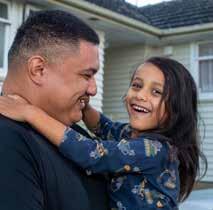
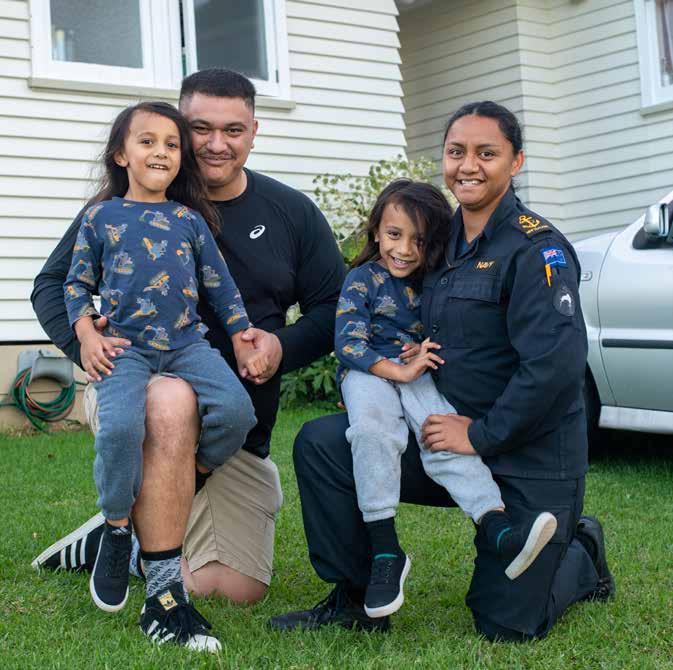
LMT(P) Steven Maynard and LLSS Boogie Kerekere with their children Kade and Neeson.






